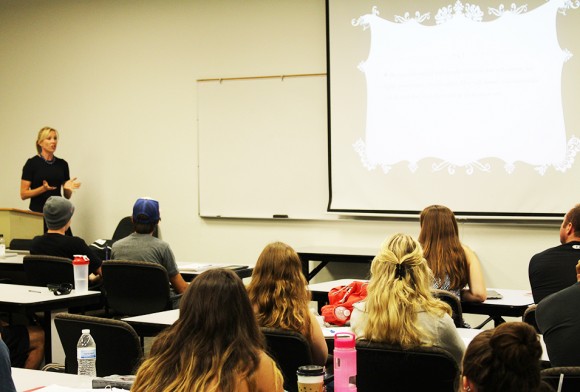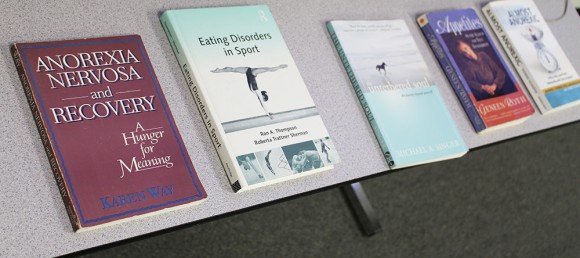
Eating Disorders; an Olympian Shares Her Story With Kinesiology Students
April 6, 2015
We were exceptionally excited to welcome advocate and cyclist Dotsie Bausch, Olympian and silver medalist from the London 2012 Olympic Games to present at Crean College.
Dr. Eric Sternlicht
, professor of
Kinesiology
, invited Dotsie to speak in his Science of Obesity course for a special presentation on eating disorders.
A strong supporter of education and healing in the realm of eating disorders, she shares her experience of recovery and how this in part, inspired her to become an athlete. Diagnosed in her early 20’s while a successful college student, Dotsie was quickly consumed by her eating disorder and continued what became a life-threatening battle for five years in total. Near the end of her recovery, Dotsie found cycling after a therapist who had closely monitored her treatment recommended she chose a light form of exercise that she did not associate a negative or competitive connection to. She was hooked early on and eventually carved out a highly successful professional cycling career. She is a ten-year member of the U.S. National Team and earned accolades at worldwide races including the London Olympic Games.
Dotsie’s presentation to the students focused on three areas including how eating disorders commonly occur, the signs and symptoms of the disease, and what one can do to aide a person with an eating disorder seek help. As students in this major have great potential to work with athletes in their future careers, Dotsie provided a better understanding of both anorexia nervosa and bulimia as well as an example of an athlete who has experienced great success after recovery.

In general, student knowledge of eating disorders is crucial as the
National Association of Anorexia Nervosa and Associated Disorders
points out a study, cited on their website, that 91% of women surveyed on a college campus had attempted to control their weight through dieting, and that 22% dieted “often” or “always”. Another study cited states that 95% of those who have eating disorders are between the ages of 12 and 25.8, occurring in both men and women.
Athletes are often at a heightened risk as the focus in training commonly involves strict management of diet and body mass. The
National Eating Disorders Association
(NEDA) cites a study of Division 1 NCAA athletes in which over one-third of female athletes reported attitudes and symptoms placing them at risk for anorexia nervosa. Though most athletes with eating disorders are female, male athletes are also at risk—especially those competing in sports that tend to place an emphasis on the athlete’s diet, appearance, size, and weight requirements, such as wrestling, bodybuilding, crew, and running. Dotsie serves as the Official Ambassador for NEDA, a non-profit organization, and speaks nationwide on their behalf.

In sharing her personal experience, Dotsie could see personality traits in herself during her college years at Villanova University that are often found in eating disorder patients such as high anxiety and obsessive compulsive behaviors. Psychology students can note, a comparison of the psychological profiles of athletes and those with anorexia found these factors in common: perfectionism, high self-expectations, competitiveness, hyperactivity, repetitive exercise routines, compulsiveness, drive, tendency toward depression, body image distortion, preoccupation with dieting and weight. (NEDA)
If you notice signs of an eating disorder in a loved one (or athlete you work with), Dotsie encourages approaching them in a sensitive and private manner. Sharing positive qualities you find in them as a person, rather than about their appearance, eating habits, and weight. She advises against being judgmental or critical of the person and to focus your comments with your own concerns for their positive well-being. She also points out that by not saying anything to someone suffering, that person may continue to believe their behavior is not harmful. In addition they could feel as though you are not concerned with their health or about them as a person. Feeling as though others don’t value them can fuel their own negative self-image and disordered eating. Providing reputable resources to those with an eating disorder is supportive towards what is ultimately their decision to seek treatment.
A big thank you to Dotsie for her time and informative presentation! For more information on Dotsie Bausch please visit her
web
site
.
If you would like more information on eating disorders or for recovery and referral information, please visit:
- Chapman University Student Psychological Counseling Services
- The National Eating Disorders Association (NEDA)


